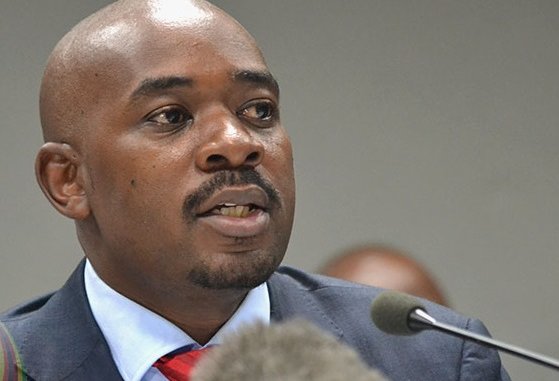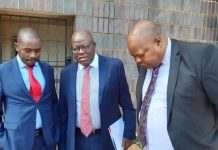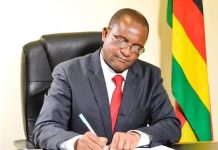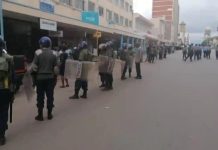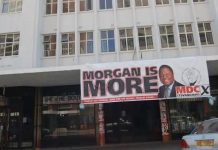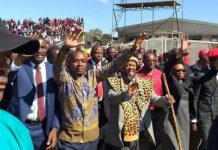Africa Press-Nigeria
As I was preparing to interview Nelson Chamisa, the popular leader of Zimbabwe’s opposition MDC Alliance via WhatsApp, my domestic worker excitedly told me she had been listening to the Zimbabwe Broadcasting Corporation (ZBC). The presenter had announced that “they” (read the notorious Central Intelligence Organisation) was looking for Chamisa, to arrest him.
When I quizzed him on this, he said the unit was always trying to arrest him for one thing or another. “But this time it is because I will not agree to take up a position that they have created for me that they think will give their government some sort of legitimacy, when that could not be further from the truth”, he said.
Zimbabwe’s Zanu-PF-led government is desperately campaigning for the lifting of sanctions on the country, a misleading cry given that the sanctions are not on Zimbabwe per se, but targeted sanctions imposed by the EU and US on certain individuals and corporations that, along with travel restrictions, have had their cash and assets frozen.
But they will not be lifted until Zimbabwe can demonstrate it practices good governance, democracy, a high standard of human rights, and guarantees freedom of speech. Bringing Chamisa into the fold could be good for its quest.
Since the 2018 election, which was allegedly manipulated and has never been satisfactorily settled by the courts, Chamisa has been, in the words of St Paul in a letters to the Ephesians, “tossed about by the waves and carried around by … the clever cunning of men in their deceitful scheming”.
He was taken to court on behalf of former deputy president of the Movement for Democratic Change — Tsvangirai (MDC-T), Thokozani Khupe who said that in 2016 Chamisa was illegally appointed as a co-deputy president by former president Morgan Tsvangirai. Previously a motion at the 2014 Congress that Tsvangirai could appoint officials outside Congress was passed, but never recorded by then secretary-general Douglas Mwonzoro, who is now firmly in the Khupe camp.
In 2017, Tsvangirai and his colleagues formed the MDC Alliance, a coalition of the parties that had broken away from the original MDC so they could contest the 2018 election as a united front. They arguably won. After Tsvangirai died in February 2018, the MDC Alliance, which had reverted to being the MDC, resoundingly declared Chamisa as his successor at Congress. In the presidential race, Chamisa won more than two million votes, while Khupe got little more than 45,000.
Yet more than a year after the election Khupe’s faction took Chamisa to court, saying he was illegally appointed as deputy -resident of the MDC-T. As the 2014 congress minutes could not be produced, the court found Khupe was the legal leader of the MDC. This was despite that by the time the case was heard, Khupe’s five-year term as deputy president had expired.
Emmerson Mnangagwa’s government is supporting and promoting Khupe as the official leader of the opposition, giving her access to party funds. She has also appropriated party headquarters. She has clung to the MDC-T name, though for all intents and purposes the party united under the alliance before the 2018 poll resumed being the MDC. She has also been firing MPs and councillors loyal to Chamisa, including the MP for Binga, Prince Sibanda, who won far more votes in his constituency than Khupe did across the entire country. This applies to most MDC MPs.
So it is true to say that, for Chamisa, getting into politics has not been easy, not that he expected it to be. He was, perhaps, prepared for a life of leadership by his mother, Alice. He grew up in Chiwara, Gutu, Masvingo. His father, Sylvana, worked in Harare for Dairyboard as a salesperson and it was up to his mother to raise her six children to be hard working, God fearing and responsible.
Like many of Africa’s leaders, among them Nelson Mandela, after whom he was named, life was not easy. Each morning he got up, tidied and went to the river to wash. He then dressed, had a quick breakfast, grabbed a packed lunch and rushed to Gumba primary school, where he started his education in 1984. Later he would return home, do his chores, such as weeding the fields, tending the vegetable garden and herding cattle, before tackling his homework.
“It was tough, but a good life lesson, as you were exposed to the vicissitudes of life. It toughens you up and you learn to do your best,” he recalled.
His mother was a devout Christian and imparted these values to her son, to the extent that he eventually, in addition to his other studies, studied theology. In 2017 was ordained a pastor in the Apostolic Church. It was, possibly, Alice Chamisa’s proudest moment.
When he was nine and still at Gumba primary, the young Nelson’s thirst for justice was first ignited. He heard about the plane crash that claimed the life of Mozambique president Samora Machel. It was popularly assumed at the time that the crash was caused deliberately by SA’s apartheid government forces, something which was only confirmed when testimony given at the Truth and Reconciliation Commission (TRC) in 1996 was declassified in 2017.
“It was at that point I knew I would spend my life fighting for a more just society. I knew it was important to challenge injustice, I knew that to do that I needed to learn about justice. You cannot contest that which you do not understand. The background of marginalisation, deprivation and oppression sets you on a course to understand the other side of life and eventually you see it is commonplace. It is the common battle of all human beings,” he said.
Chamisa describes Alice, who died in July, as “the pillar of my life. She inspired me to work hard and was adamant about me getting a good formal education. That is why I am where I am today. I am so grateful to her”.
When he delivered the eulogy at her funeral in Chiwara, he spoke about how his mother remained humble, working hard at her entrepreneurial ventures to support him through his studies. “She was my rock, a pillar of strength”. Her encouragement drove him to achieve an honours degree in politics and public administration, He has an LLB and is an admitted advocate in the Zimbabwe court. He also has a master’s degree in governance and the rule of law from Stanford University in the US. As if that were not enough, he has a qualification in marketing and business administration.
He entered politics when he was secretary-general of Zimbabwe students’ union in the 1990s, when Tsvangirai was secretary-general of the Zimbabwe Congress of Trade Unions, the country’s umbrella trade union organisation.
“We joined forces as a labour forum agitating for the rights of students and workers. It got to the point where students were demanding better food in our dining rooms, but we needed to start talking about the real issues of governance and people’s rights.”
“That is when I became very involved in politics. In 1999, we ended up coming together with labour as the Movement for Democratic Change.”
Chamisa remained faithful to Tsvangirai, though the party, like many young political parties, has experienced rifts and fractures. When Tsvangirai died, he succeeded him as president of the MDC Alliance, now the MDC, which still, arguably, enjoys the greatest opposition support in Zimbabwe.
Chamisa has witnessed a litany of stolen elections and brutality at the hands of Zanu-PF agents.
In March 2007, when Tsvangirai and his colleagues in the MDC were beaten and tortured by the Zimbabwe police, Chamisa was attacked at Harare Airport as he was about to board a plane to attend committee meetings of the African, Caribbean and Pacific/EU Joint Parliamentary Assembly. He was beaten with an iron bar, which cracked his skull. Immediately after the attack, he told a foreign correspondent, Andrew Meldrum, that they also held up his legs and kicked his testicles so hard they were forced up into his abdomen.
The brutality experienced by him and his colleagues in the opposition and their supporters, particularly in the run-up to the 2008 election, resonated like a dark cloud. But the excitement he has felt about he and his colleagues being able to show ordinary Zimbabweans what it could be like to live in a just and democratic country still drives him.
After the particularly bloody 2008 election, which was a close race, there was supposed to be a runoff. However, Tsvangirai declined it as he felt the people and the economy could not suffer any longer and reluctantly entered into a government of national unity (GNU) with Zanu-PF.
The move echoed that made by Joshua Nkomo in 1987, in the wake of the Gukurahundi, in which 20,000 of his people were slaughtered by government forces. He, too, entered into a unified government to save his people.
The GNU that saw Tsvangirai become president gave Zimbabweans some welcome respite and under Tendai Biti, the minister of finance who dollarised the economy, education minister David Coltart and others, Zimbabwe was, for a few years, stable and moving forward.
Chamisa served in the GNU as minister of information and communication technology. But it was not easy. Before he died, Tsvangirai told me that having to deal with former president Robert Mugabe was like “supping with the devil — he was pure evil”. By 2013, before the next election, which also appeared dodgy, but was given the seal of approval by the SADC and the AU, the honeymoon was over.
When one takes Chamisa’s experience and qualifications into account, he is well qualified to be the president of Zimbabwe and, in 2018, it looked as through his time had come, but unexpected factors got in the way.
“We were excited because as counting ended at individual polling stations and polling agents agreed each tally and signed and recorded the V11 forms that are supposed to be posted outside each station, we were sure we had done it. As usual, we sent each result to party headquarters, the observer missions and to the ZEC (Zimbabwe Electoral Commission) command centre.
“Suddenly, when it was clear that the MDC Alliance was winning, the ZEC command centre announced that the V11 forms should not be posted outside the stations.
“The results are supposed to be in real time”, he explained.
“There is a combination of a manual platform and a digital platform, so when the results are received, they are supposed to be submitted to the command centre to collate the results.
“But the 2018 election deviated from the norm”, Chamisa said. They counted the votes for the presidential vote constituency by constituency across the country, instead of using the total. They wanted to establish the trend. And when they realised they had lost the election, they announced that the signed V11 forms should not be posted outside the stations. The ZEC then deployed people to the various centres, where we assume there were all sorts of interferences.”

